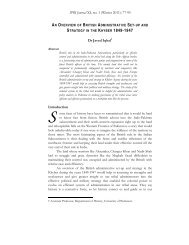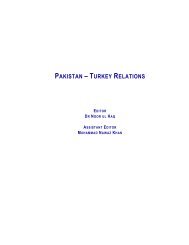120 Whither Kashmir? (Part II) - Islamabad Policy Research Institute
120 Whither Kashmir? (Part II) - Islamabad Policy Research Institute
120 Whither Kashmir? (Part II) - Islamabad Policy Research Institute
You also want an ePaper? Increase the reach of your titles
YUMPU automatically turns print PDFs into web optimized ePapers that Google loves.
70 IPRI Factfile<br />
like ‘will to fight’ and ‘moral force’ have been more noted in the latter<br />
who have exerted psychological impact of causing fear, shock, mental<br />
depression and stress, resulting in demoralisation of the Indian military<br />
and paramilitary troops.<br />
In this regard, numerous cases of suicides among Indian troops—<br />
opening fire on their colleagues and several other tense reactions have<br />
been reported in respect of Indian forces in the controlled territories of<br />
<strong>Kashmir</strong>.<br />
In the recent past, Lt. Col. Pankaj Jha shot himself with a service<br />
revolver, while Maj Sobha Rani, Capt Sunit Kohli, Lt Sushmita<br />
Chatterjee and a number of other officers of the Indian army also did the<br />
same in one or the other way.<br />
Indian defence analysts and psychologists have indicated various<br />
causes of suicides and fratricides, found in the Indian military, stationed<br />
in the Jummu and <strong>Kashmir</strong>. They have attributed these trends to<br />
“continuous work under extreme hostile conditions, perpetual threat to<br />
life, absence of ideal living conditions, lack of recreational avenues, and of<br />
course; the home sickness due to long separation from families.” While<br />
other experts have pointed out that the growing stress in the Indian<br />
armed forces is owing to “low morale, bad service conditions, lack of<br />
adequate home leave, unattractive pay and a communication gap with<br />
superiors.”<br />
Retired Maj Gen Afsar Karim, who has fought three wars, remarks,<br />
“The stress may be high among soldiers because of lack of leave.” He<br />
further explains, “The army is involved in a tough long running internal<br />
security environment. There is lack of rest…soldiers get angry when they<br />
are denied leave and their officers themselves take time off. It triggers a<br />
reaction, while they are well armed and they take their own lives” or<br />
those of their colleagues.<br />
Another Indian military analyst reveals, “then there is the question<br />
of what many say is low pay…starting salaries in many jobs in middleclass<br />
of India are double that of a new soldier, and for many of them, the<br />
army no longer holds out the promise of a good life.”<br />
According to the Indian Col SK Sakhuja, “soldiers kill each other<br />
when one of them perceives that they are being harassed by superiors or<br />
when they have heated arguments among themselves.”<br />
An Indian parliamentary panel had indicated that the military<br />
establishment was not taking reports of suicides and fratricides seriously.<br />
The Parliamentary Standing Committee on Defence, in its 31st report on




